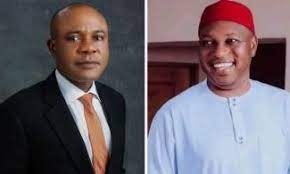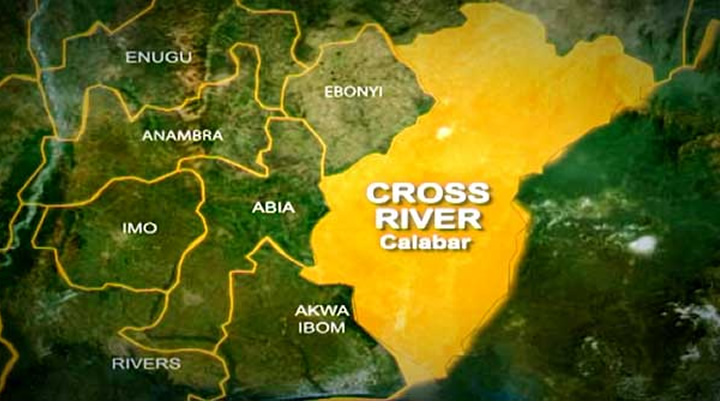Politics
Enugu Guber: Tribunal Reserves Judgment Sine Die

The Enugu State Governorship Election Petitions Tribunal has reserved judgment on the petitions challenging the election of Governor Peter Mbah after parties in the matter adopted their written addresses.
At the resumed proceeding of the Tribunal, on Wednesday, Justice Akano, who led the panel, reserved judgment on a date, he said would be duly communicated to the parties.
In the main matter, the candidate of the Labour Party (LP), Chijioke Edeoga is challenging the validity of the Independent National Electoral Commission’s (INEC) declaration of Peter Mbah of the Peoples Democratic Party (PDP) as the elected governor in the March 18, 2023 governorship elections.
While the petitioners (Edeoga and LP) were present in court, the second respondent (Dr Mbah) was represented by his counsels on Wednesday.
The INEC is the first respondent in the petition, and Dr Mbah and PDP are listed as the second and third respondents respectively.
Adopting his address, Dr Mbah’s counsel, Wole Olanipekun, SAN, asked the court to dismiss the petitions of the LP for lacking in merit and a mere academic exercise.
Similarly, counsel to the PDP, Anthony Ani, SAN, contended that the argument of the petitioners was vague and lacking in evidence.
Adopting his final address, Adegboyega Awomolo, SAN, lead counsel to the LP and its governorship candidate, asked the tribunal to hold the position of his clients and grant the reliefs sought by his client.
According to him, it had been established beyond any reasonable doubt that Dr Mbah was at the time of the election not constitutionally qualified to contest for the election having presented a forged certificate of national service to INEC.
Adegboyega Awomolo highlighted the issues of over-voting, non-use of BVAS, and alleged forgery of NYSC certificate, among others brought by the petitioner as reasons why the matter should be decided in favour of Edeoga, his client.
Politics
Leadership Newspaper Backs Adeleke For Second Tenure, Names Him ‘Gov Of The Year’

It was a plethora of pleasantries in Osogbo on Thursday, when Osun State Governor, Senator Ademola Adeleke was named 2024 Governor of the year and endorsed for second tenure in office by the top management of the Leadership Newspaper.
The newspaper’s team was on a courtesy call on Gov Adeleke, Biztellers reports.
Receiving them at the Government House, Gov Adeleke noted that his administration had reduced the infra deficit by over 40 percent.
He added that his administration had also bridged access to primary health care, with an ambition to expand health access at medium and tertiary levels.
He said, “Osun State is constantly getting recognitions for what outsiders and even opposition members regard as our commendable performance.
“In the last one year, our government has been conferred with several awards across the sectors. Aside from reputable newspapers like the leadership stable, we have received accolades from several federal agencies and non-governmental bodies. The consensus from those reviewing our performance and service delivery is that we are true agents of good governance.
“In all these positive ratings, my response has always been to task my team to double their efforts. In the face of overwhelming positive reviews and high approval ratings, I am compelled to drive my team harder. When recently, some opposition figures confessed to our positive ratings, I still believe we have a lot of grounds to cover.
“I am not allowing the praises to enter my head. While it may be true that I have delivered a four-year task in under two years, I am propelled to do more because Osun has been left behind on many fronts. As I have reduced the infra deficit by over 40 percent, my real target Is higher. As I have bridged access to primary health care, my ambition is to also expand health access at medium and tertiary levels. While our records across the sectors are laudable as your newspaper has acknowledged, the ultimate goal is to accelerate infra upgrade alongside the boosting of soft investment for the well-being of our people.
ALSO READ: Lawmaker Introduces Bill To Allow Trump A Third Presidential Run
“I appreciate your candid endorsement of our performance. It is important to note that your yardstick for recognizing us correlates with similar reasons adduced by others. Our huge governance records are undeniable facts especially in workers’ welfare, infrastructure delivery, educational expansion, health care access improvement, solid mineral sector reforms, digital economy initiatives, agricultural mechanisation among others.
“I want to assure the public that our administration is not slowing down. Very soon, I will flag off ongoing remodeling of Osogbo stadium to assume international standard. Prior to the ongoing stadium project, we have engineered the creation of Osun Sport Commission and Osun Sport Fund through appropriate legal and policy framework.
“Very soon, I will be flagging off the dualisation of phase one of Odoori – Post office road at Iwo. The contractor for Iwo -Osogbo road has mobilized to site. We plan to complete the two projects within the life of this administration. Meanwhile, the dualisation project at Ilesa is progressing while the flyover bridge at Ile Ife is ongoing with appreciable progress. 2025 is billed to be a year of further expansion of good governance for the good of man and humanity.
On his part, the Vice Chairman of Leadership Group Mike Okpere, noted that the recognition is in order to give Gov Adeleke an insight and encouragement to do a second term.
“Your excellency you will see that, we didn’t just come down here, we had a meeting before the award and that is why we are here, so this trip is to notify you formally for this award and we personally invite you on the 8th of April at the Banquet Hall of the State House in Asokoro where this award will be handed on over to you.
“Our Reputable Person of the Year is Aliko Dangote, you all are aware of the investment he just concluded, by bringing fuel production into Nigeria, because of that and many other things, we chose him as our person of the year.
“Other person’s that would be sharing the merit are other governors that have touched people’s lives, among them is the Governor from Akwa Ibom State, the Governor of Enugu State, the Governor of Jigawa State and the Governor of Kano State.
“We didn’t call this Leadership Governor of the year, we call it Governor of the year, in other words, what we are saying is that, this recognition will give you an insight and encouragement to do a second term.
“As a newspaper company, we don’t endorse Governors but when we see something we say it, your Excellency sir, I therefore want to present this notification and official invitation”, he added.
Other members of the Leadership Newspaper team includes, Abraham Nda Isaiah, Director, Leadership Group, Ibidiran Ayokunle, Head Southern Operations, Joshua Dada, Osun State.
Politics
C’River Assembly Moves To Amend LG Law, Proposes More Political Appointments

The Cross River State House of Assembly has initiated the process to amend the Local Government Law 2007, introducing provisions to expand political appointments and enhance local government administration across the state.
The bill, sponsored by Rt. Hon. Davies Etta, representing Abi State Constituency, was debated on Tuesday in Calabar.
It proposes increasing the number of appointees in each Local Government Area (LGA) to 50. Among the new roles are 16 Special Adviser positions and a cadre of officials known as Ward Relation Officers.
According to the bill, “The Chairman of Council may appoint such a number of Special Advisers to assist him in the discharge of his duties, provided that appointments, when added to other statutory appointments, shall not exceed a total number of 50.”
The proposed Ward Relation Officers will hold ranks equivalent to Special Advisers and will report directly to the Chairmen of their respective LGAs.
This move, the Assembly says, is aimed at fostering grassroots engagement and improving governance at the local level.
Another key provision of the bill seeks to elevate the office of the Head of Local Government Administration (HOLGA) to the status of a Permanent Secretary within the state public service.
The amendment stipulates that HOLGAs will enjoy all the rights, privileges, and entitlements of Permanent Secretaries, including pensions.
“The office of the HOLGA shall be equivalent to the office of a Permanent Secretary of the State Public Service and shall enjoy all rights and privileges of the Permanent Secretary, including pensions,” the bill states.
It also specifies that appointments to the HOLGA position must be made exclusively from within the local government service in the state.
The bill, which has passed its first and second readings, has been referred to a joint committee on Local Government Affairs, Judiciary, and Public Accounts for further review and consultations with stakeholders.
Speaker of the Assembly, Rt. Hon. Elvert Ayambem, underscored the importance of the proposed amendment, noting that it would strengthen local government administration and improve service delivery to the grassroots.
The Assembly is expected to hold further deliberations before making a final decision on the proposed amendments.
Politics
Trump Completes Return To White House, As 47th US President

Donald Trump has completed his return to the White House with his inauguration as the 47th President of the United States (POTUS).
Trump’s historic return, on account of adverse weather conditions, happened with a remarkable ceremony at the Capitol Rotunda, on Monday.
In his inaugural address, President Trump outlined a bold agenda for his administration, touching on issues of gender, race, border control, economic reforms, and energy policies.
ALSO READ: CSR: Dangote Awards Scholarships To 473 Students
President Trump asserted that his administration would recognise only two genders — male and female — effectively dismissing identities such as transgender, non-binary, and genderqueer.
President Trump asserted, “This week, I will end the government policy of engineering race and gender into every aspect of public and private life. Henceforth, it will be the official policy of the United States government that there are only two genders: male and female.”
He unveiled plans to overhaul the trade system, introducing an “External Revenue Service” to collect tariffs from foreign countries, promising to shift the economic burden away from U.S. taxpayers.
“I will immediately begin the overhaul of our trade system to protect American workers and families. Instead of taxing our citizens to enrich other countries, we will tariff and tax foreign countries to enrich our citizens,” Trump stated.
The POTUS vowed to make America a “manufacturing nation” again by leveraging the country’s vast oil and gas reserves.
“America will be a manufacturing nation once again. We will use our liquid gold — oil and gas — to bring prices down, fill our reserves, and export energy worldwide. We will end the Green New Deal and revoke the electric vehicle mandate, saving our auto industry,” he said.
On border control, President Trump declared a national emergency at the southern border and announced measures to combat illegal immigration.
“All illegal entry will be halted, and we will begin the process of returning millions of criminal aliens. The Remain in Mexico policy will be reinstated, and catch-and-release practices will end. Troops will secure our borders to repel this invasion,” he announced.
He also pledged to designate cartels as foreign terrorist organizations and invoke the Alien Enemies Act of 1798 to combat criminal networks.
The POTUS announced the formation of a Department of Government Efficiency and outlined measures to tackle inflation and high costs.
He also promised an aggressive crackdown on crime, leveraging federal and state resources to eliminate gang activity.
“As commander-in-chief, I have no higher responsibility than to defend our country from threats and invasions,” President Trump added.
He recounted an assassination attempt during his campaign, framing his survival as a divine sign of his purpose to “make America great again.”
In addition, President Trump criticised America’s healthcare and education systems, promising significant reforms to address inadequacies exposed by recent natural disasters.
The event, attended by lawmakers, distinguished guests, and family members, marked the beginning of President Trump’s second term. Vice President JD Vance was also sworn in, taking the oath of office in a ceremony presided over by Supreme Court Justice Brett Kavanaugh.
It was gathered that earlier in the day, President Trump and Melania Trump met with outgoing President Joe Biden and former First Lady Jill Biden, continuing the tradition of a handover meeting between administrations.
At a pre-inauguration rally, President Trump addressed supporters, promising to pardon January 6 defendants and issuing executive orders on his first day in office.
Despite freezing temperatures, the ceremony proceeded with President Trump expressing confidence in his administration’s vision and America’s future.

















